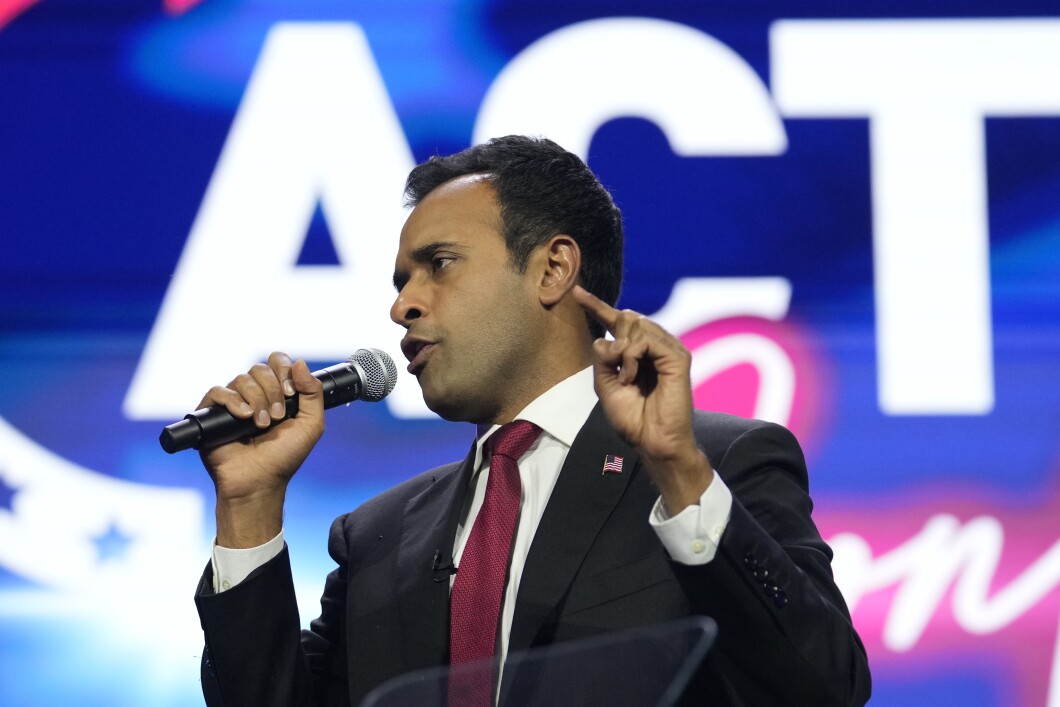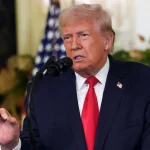
EXCLUSIVE — Presidential candidate Vivek Ramaswamy admitted he made false claims about his voting history after the Washington Examiner confronted the 2024 Republican contender with state election records.
Ramaswamy notably asserted in two interviews released on June 30 and July 12 that he did not vote until 2020, when he backed former President Donald Trump over now-President Joe Biden. However, the wealthy entrepreneur actually first voted in the 2004 presidential election for the late Libertarian nominee Michael Badnarik, according to Ramaswamy as well as Ohio database records in Butler and Franklin counties.
ALL IN THE FAMILY: DEMOCRAT MAXINE WATERS PAYS THOUSANDS MORE FROM CAMPAIGN TO DAUGHTER
“It was a throwaway vote,” Ramaswamy said in an interview with the Washington Examiner, emphasizing he purportedly forgot about heading to the polls in 2004, when he was 19, and “was disgusted” at the time with both Republican George W. Bush and Democrat John Kerry, the other nominees. “A throwaway vote in that I knew it was a candidate who was not going to win.”
The White House hopeful’s campaign had initially said Ramaswamy didn’t remember who he voted for after this reporter contacted it with the state records, which list his political participation but not specific candidates. His campaign previously claimed Ramaswamy thought he “must have voted Republican” in 2004 but then said he voted for Badnarik.
“I was very cynical and jaded,” the 2024 candidate said, later adding that he didn’t remember the 2004 vote because “it wasn’t meaningful to me” since Ramaswamy had just graduated High school. “I remember being, as I was, very disaffected. John Kerry versus George Bush left me deeply uninspired. And, you know, I didn’t think my vote was going to make a difference.”
Ramaswamy’s remarks come after he responded, “Yup,” during a July Scripps News interview upon the journalist stating, “I was surprised to hear that you had not voted until 2020, until the 2020 presidential election. So you voted for the first time, now it’s a little bit over two years. You’re running for president. That’s a pretty big jump to just go from voting, now two-and-a-half years later, to run.”
Ramaswamy replied in the Scripps News interview, “I mean the reality is, most young people in this country don’t vote because they’re not excited by the candidates that they see. And in my twenties, I was much the same way. Something changed for me when I became a father in 2020. That’s when my first son was born. It just changed my perspective, to say that I’m not just going to passively sit aside just because I’m not excited by other candidates.”
Weeks earlier, in June, Ramaswamy was asked on the Breakfast Club radio program, “When is it that you voted for the first time?”
The candidate similarly said, “I voted in 2020.”
Ramaswamy then said, “A long time is the answer,” when asked by the host, “So for how many years you sat around and did not get involved at all in any civic engagement? Is that my understanding?”
“And actually, that’s what I wrote this book about. I am not holding myself out as some sort of model. I’m actually offering myself as a self-reflection of my journey as a citizen, to whom this country has given much,” Ramaswamy replied, pointing in the room over to his 2021 book, Woke, Inc.: Inside Corporate America’s Social Justice Scam.
News of the discrepancy between Ramaswamy’s prior claims about voting, and later admission to the Washington Examiner about his 2004 vote, come as the entrepreneur surges in the 2024 GOP presidential primary polls. Ramaswamy tied at 12% with Gov. Ron DeSantis (R-FL) in a Kaplan Strategies survey of 800 likely Republican primary voters released last week, while Trump sat at 48%.
A RealClearPolitics polling average of the GOP primary finds Trump support at 52.3%, DeSantis at 18%, Ramaswamy at 5.5%, ex-Vice President Mike Pence at 5.5%, former United Nations ambassador Nikki Haley at 3.5%, and Sen. Tim Scott (R-SC) at 2.9%. Hopefuls polling under 3% include ex-New Jersey Gov. Chris Christie, ex-Arkansas Gov. Asa Hutchinson, Gov. Doug Burgum (R-ND), and Miami Mayor Francis Suarez.
Badnarik, the 2004 Libertarian nominee that Ramaswamy voted for, said while running he would “veto any legislation restricting a woman’s right to choose” and “opposes government control over abortion,” according to his archived campaign website. The Libertarian, who died in 2022, also supported ending “immigration restrictions for peaceful individuals who come to America to work, study and live” and flirted with conspiracies related to the Sept. 11 terror attacks carried out by al Qaeda.
In a blog post on Sept. 11, 2011, Badnarik wrote, “We should assiduously follow the evidence until we uncover the cold, unvarnished truth, even if we discover that certain members of our own government were [knowledgeable], or even complicit in planning the attack.”

Upon being asked by the Washington Examiner when he stopped being a Libertarian, Ramaswamy said, “You know I wouldn’t even call my — I still don’t use the word Republican and Democrat in my speeches. I don’t like those words very much.”
“But I did go from libertarian to conservative, is what I would say,” Ramaswamy added. “It sort of happened a little bit in law school, and then it really happened once I became a parent.”
“I think the gist of my journey to being a conservative rather than a Libertarian doesn’t actually involve abandoning most of my Libertarian convictions,” the candidate said. “It actually involves caring about more issues than Libertarians care about. Like, I think culture actually matters. Family actually matters. There are things outside of the classical relationship between the state and the individual that matter for a thriving society. Libertarianism, in some ways, has nothing to say about what we’re going to do after we’re all living in that state of nature.”
CLICK HERE TO READ MORE FROM THE WASHINGTON EXAMINER
While Ramaswamy punched the 2004 ticket for a Libertarian, he is not the only 2024 GOP presidential hopeful who didn’t always vote Republican.
Trump famously was a registered Democrat and changed his party affiliations through the years before getting elected in 2016, telling CNN’s Wolf Blitzer in 2004, “In many cases, I probably identify more as Democrat.”





